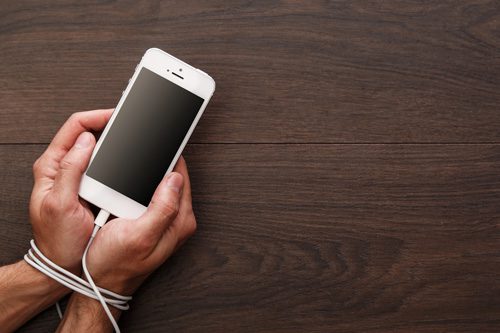 The simple answer: to avoid distractions and focus on recovery.
The simple answer: to avoid distractions and focus on recovery.
The more complex answer involves the necessary evolution you need to experience when going through substance abuse treatment. There’s a root cause for addictive behavior. Once your brain is altered because of substance abuse, it’s much harder to control the compulsion to use.
In order to fully recover from addiction, certain physiological, mental, and emotional changes have to happen. This requires your complete commitment. For a number of reasons, electronic devices may deter your progress.
How Electronics Distract Us
One of the preeminent experts in society’s relationship with technology is Sherry Turkle, the Abby Rockefeller Mauze Professor of the Social Studies of Science and Technology in the Program in Science, Technology and Society at MIT. She’s also the founding director of the research center Initiative on Technology and Self.
For more than 30 years, Turkle’s work as an educator, author, and researcher centered on the rise of human engagement and technology and at first, she celebrated the seemingly endless possibilities. She imagined a truly united global society, each culture learning from one another, expanding connections.
In the past 10 years, especially with the increase of smartphones—more than two billion people worldwide have them now—Turkle noticed a shift. For all our potential broadband connections, we actually feel more isolated than ever before. “People are lonely. The network is seductive. But if we are always on, we may deny ourselves the rewards of solitude,” is one of her observations.
And here’s another: “When people are alone, or feel a moment of boredom, they tend to reach for a device. In a movie theater, at a stop sign, in a checkout line and yes, at a memorial service, reaching for a device becomes so natural we start to forget there’s a reason, a good reason, to sit still with our thoughts: it honors to what we are thinking about. It honors ourselves.”
So, during treatment, if you can’t process your thoughts and emotions effectively, and don’t allow space for them, identifying the root cause of addiction will be more difficult.
Turkle isn’t the only one recognizing that our current relationship with technology presents a problem. As far back as 2013, researchers noticed a trend in electronic distraction among health care professionals. Because many of them need their personal electronic devices (PEDs) for work, they’re “on” constantly. Unfortunately, the study revealed their PED distraction led to startling statistics:
- Approximately 50 percent admitted to texting during cardiac bypass procedures
- More than 30 percent missed crucial clinical information during patient interactions
Forbes released an interesting article in 2017 that detailed all the ways mobile devices distract workers. For example, the average worker between the ages of 18 and 24 receives 109 messages a day! Of that, probably more than a third occur during work hours. As soon as we hear the alert, we lose concentration because we wonder what it’s about. If we ignore it, we’re still prone to work errors because we’re distracted—about 25 percent more likely. Once we review it, not only do we respond, but also we think of other non-work tasks to do on our phones.
There also continues to be constant debate in classrooms regarding PED use. On one hand, devices make certain tasks such as sharing notes and research easier, and sometimes help increase engagement. On the other hand, having a device nearby compromises morality regarding cheating; increases cyberbullying and sexting; challenges comprehension of the material; and inhibits face-to-face social interaction. Educators continue to be divided on the issue.
Electronics Addiction Is Real
There’s another valid reason why using electronics during treatment, at least at first, may not be allowed: it’s addictive.
TechCrunch reported in 2017 that Americans spend a minimum of five hours a day on mobile devices—an increase of 20 percent since 2015. Statistics in this story also indicate that users allot 51 percent of their time to messaging, apps like Snapchat, and social media.
New research classifies the fear of being without a mobile device as nomophobia. It’s defined as having feelings of distress or anxiety when we don’t have our phones and the degree to which we depend on PEDs to fulfill basic needs. These articles from Scientific American and CNN examine some of the details of this condition, and share a special quiz you can take to determining your level of reliance and how PEDs interfere with your daily life. If you take the quiz and score between 61 and 99, that’s an indication of a problem.
Internet addiction disorder is also a concern for people in rehabilitation. Studies indicate that when we seek information and get a response, or engage in certain online interactions, there’s a spike in dopamine, the chemical responsible for stimulating the pleasure center of the brain.
If you’re struggling with substance abuse, neurons and receptors are already altered. Engaging in social networking, blogging, email, online shopping, gaming, and online pornography to a point where it interferes with or detracts from daily responsibilities provides the exact same gratification stimulus that drugs and alcohol do.
Maintaining Realistic Expectations
Conversely, being connected or online constantly, whether in rehab or not, often presents a false reality. As Turkle noted, there’s good reason to be present for authentic thoughts and emotions. When we deny the truth, it’s harder to cope.
While in treatment, it’s important to develop the strength to peel back the layers and get to the heart of your true self. It’s also crucial to learn how to sleep without the interruption of electronic stimulation.
So for now, facilities such as Twin Lakes may not allow PEDs. This doesn’t mean you’re cut off from the world. It’s simply a method to help you dedicate yourself to the process of healing during your stay. Over time, your care plan may allow incremental use.



